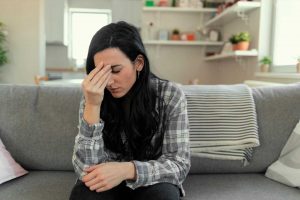Get medical help if you spot these symptoms after AstraZeneca Covid vaccine, experts says

PEOPLE who have had the Oxford/AstraZeneca coronavirus vaccine should seek help if they experience a severe headache or shortness of breath, experts have warned.
There are six symptoms people need to look out for from around four days to four weeks after vaccination.
? Read our coronavirus and green list announcement live blog for the latest updates
Millions of people have now received a coronavirus vaccine in the UK.
Side effects can occur with all medications and coronavirus vaccines are no exception to this.
As of April 28 the Medicines & Healthcare products Regulatory Agency (MHRA) has received 242 reports ofblood clotting cases in people who also had low levels of platelets in the UK, following the use of Oxford/AstraZeneca jab.
It means the overall chance is just 10 in a million.
This is a tiny amount compared to the millions of people who have had the jab.
Experts say the risks are massively outweighed by the jab’s benefits for most people.
Speaking at a press conference today Dr June Raine, MHRA Chief Executive said that the risks had been evaluated by experts.
With that in mind the The Joint Committee on Vaccination and Immunisation (JCVI) today revealed that people who are aged 40 and under should be offered an alternative jab.
This will only be where this is available and only if this does not cause any substantial delays in being vaccinated.
KNOW THE SIGNS
Experts today said that you should look out for the six signs.
- a severe headache that is not relieved with painkillers or is getting worse;
- a headache that feels worse when you lie down or bend over;
- a headache that is unusual for you and occurs with blurred vision, feeling or being sick, problems speaking, weakness, drowsiness or seizures;
- a rash that looks like small bruises or bleeding under the skin;
- shortness of breath, chest pain, leg swelling or persistent abdominal pain.
The JCVI said that this is a precautionary measure and urged those who had already had their first dose to still attend their appointment for the second.
Professor Wei Shen Lim, Covid-19 Chair for JCVI said that safety remains the number one priority.
“We have continued to assess the benefit-risk balance of Covid-19 vaccines in light of UK infection rates and the latest information from the MHRA on the extremely rare event of blood clots and low platelet counts following vaccination.
“As Covid-19 rates continue to come under control, we are advising that adults aged 18 – 39 years with no underlying health conditions are offered an alternative to the Oxford/AstraZeneca vaccine, if available and if it does not cause delays in having the vaccine.
"The advice is specific to circumstances in the UK at this time and maximises use of the wide portfolio of vaccines available.
“The Covid-19 vaccines have already saved thousands of lives and the benefit for the majority of the population is clear – if you are offered the vaccine, you should take it.”
The vaccine-induced blood clots have been described as unusual. They occur in major arteries, including to the brain, combined with low blood platelets.
Only six cases have occurred after a second dose, according to the UK medicine regulator the MHRA.
Dr June Raine, MHRA Chief Executive said today: “Public safety is always at the forefront of our minds and we take every report seriously.
“Our position remains that the benefits of the COVID-19 Vaccine AstraZeneca against Covid-19, with its associated risk of hospitalisation and death, continues to outweigh the risks for the vast majority of people.
"The balance of benefits and risks is very favourable for older people but is more finely balanced for younger people…"
Dr Raine said vaccine safety is "rigorously monitored" and blood clot cases have been "scientifically scrutinised".
“The public should be reassured of our continuing high standards when monitoring these vaccines for safety, quality and effectiveness", Dr Raine added.
“It is still vitally important that people come forward for their vaccination when invited to do so.
“We ask anyone who suspects they have experienced a side effect linked with their COVID-19 vaccine to report it to the Coronavirus Yellow Card website.”
Source: Read Full Article


